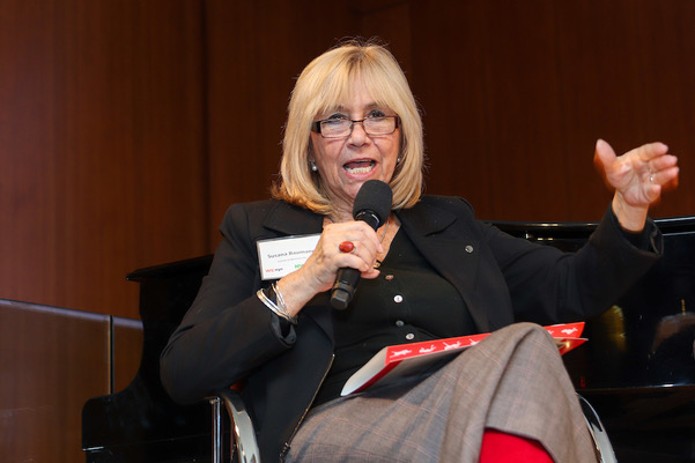NEW YORK, NY — April 13, 2022 — (NOTICIAS NEWSWIRE) — The message is loud and clear for Latinas and other minority women-owned businesses. You are not getting it!
Despite big announcements from traditional funders and allocators of capital that inclusion strategies for minority female founders’ access to capital are on the way, we have not moved an inch, not a centimeter!
We are not getting it, and I’m tired of funding “genderization.”
Many can blame the pandemic, that women had to become caregivers of their parents and/or children, and still try to save their businesses. They can argue women had to leave or close their businesses because of the lockdown and criticize government pandemic measures. They can also find excuses for raising operating costs or supply chain disruptions, but haven’t these been the same conditions for all small businesses operating during a challenging year?
According to a Biz2Credit study that reviewed 100,000 credit inquiries, “women-owned business profits averaged $88,995, much less than 2020’s figure of $119,654, and $47,152 less than the average for male-owned firms ($136,147) in 2021. In 2021, the effects of the pandemic were especially notable for women-owned companies, many of whom have been historically less well-financed compared to men-owned firms.”
The study also found that “profits for female business-owners dropped 26% in 2021 from 2020, while average annual revenues dipped 4%.”
- Average Annual Revenue dropped from $493,401 in 2020 to $475,707 in 2021.
- Average Profits (annual revenue – operating expenses) of women-owned businesses fell to $88,995 in 2021 from $119,654 in 2020
- Average Expenses increased from $373,748 in 2020 to $386,712 in 2021.
- Average Credit Score for female business owners dropped from 588 in 2020 to 580 in 2021.
- Top Industry: Services (except public administration) represented 31.9% of the women-owned companies in 2021.
Latinas and other minority women-owned businesses stall big time
Since the frenzy reported by American Express, The 2019 State of Women-Owned Business Report, between 2014 and 2019, the number of women-owned businesses climbed 21% to nearly 13 million (12,943,400). Employment grew by 8% to 9.4 million. Revenue rose 21% to $1.9 trillion.
While the number of women-owned businesses grew 21% from 2014 to 2019:
- Firms owned by women of color doubled that rate (43%).
- Numbers for African American/Black women grew even faster at 50%.
- Native-Hawaiian/Pacific Islander (41%),
- Latina / Hispanic (40%),
- Asian-American (37%) and
- Native American/Alaska Native (26%) businesses grew more slowly than for women of color in general but faster than overall women-owned businesses and all businesses.
As of 2019, women of color accounted for 50% of all women-owned businesses. Today, they are up to 54% (estimated).
However, the disparity between minority and non-minority women is increasing.
- In 2014, minority-owned businesses averaged $67,800 in revenue;
- By 2019, the average had dropped to $65,800.
- In 2014, non-minority women-owned businesses averaged $198,500 in revenue;
- By 2019, the average had jumped to $218,800.
From 2014 to 2019, the average revenue for women-of-color-owned businesses shrank, except for Asian women-owned businesses. As the number of minority-women-owned businesses surges, the entry of smaller, younger companies into the pool could be lowering average revenue figures for these businesses.
It’s funding “genderization,” and this information proves it
The culprit of these gaps is the missed opportunity for female founders -especially Latinas and other minority women entrepreneurs- to secure funding for their businesses. Their access to venture capital continues to decrease percentage-wise.
According to a report by research firm PitchBook, “female founders secured only 2% of venture capital in the U.S. in 2021, the smallest share since 2016 and a sign that efforts to diversify the famously male-dominated industry are struggling.”
Although it was the second year in a row that women’s percentage of V.C. funding decreased, the overall dollar value of female funding rose because total funding levels in 2021 hit all-time highs, according to the report.
The report stated that “U.S. startups founded solely by women raised nearly $6.4 billion of venture funding in 2021, 83% higher than the total raised in 2020. The accelerated pace of funding is part of an exceptionally strong year for V.C. investment across the U.S., which eclipsed its previous record and topped nearly $330 billion in 2021.”
The truth is, these numbers have been almost steady for female founders, especially Latina entrepreneurs and other minority women-owned businesses, for quite some time. “Black female startup founders have received just 0.34 percent of the total venture capital spent in the U.S. in 2021; however, the dollars invested in their companies are on the rise,” an analysis of Crunchbase data shows.
“The dollar amount received in angel, pre-seed, and seed rounds for venture-backed Latinx-owned startups in the U.S. had barely budged since 2018 when $185 million went to Latinx-owned companies raising those earliest rounds,” Crunchbase data shows.
In 2021, Latinx startups raising angel, pre-seed, and seed rounds only received $205 million, a mere $20 million increase from three years earlier. Almost all of the growth in funding that Latinx founders have seen in recent years went primarily to later-stage startups.
“When women teamed up with a male co-founder, they tended to raise more,” says the report. The mixed-gender female-male founder teams secured 15.6% of total venture cash in 2021, the highest amount since 2017!
One last detail: According to a DocSend data report, potential investors spent 50 percent more time scrutinizing the slide that details milestones and growth metrics of the company of all-female teams’ pitch decks than they do of all-male teams’ pitch decks.
Women need funding, and they need it NOW
Female founders secured only 2% of venture capital in the U.S. in 2021, the smallest share since 2016, a sign that efforts to fund them in this male-dominated industry not producing results. The statistic may sound familiar; it’s the exact same portion of capital startups founded by a solo female founder or an all-female team secured last year, too, according to PitchBook.
In a male-dominated industry, V.C. firms with female decision-makers represent less than 10% of all firms, and 74% of U.S. V.C. firms have zero female investors.
But do we need women sitting on those decision-making seats to invest in other women?
Why it is not enough for women to be talented and have a solid business proposition to receive the funding they need?
in the views of funders, what does a male founder guarantee in a business deal that a female founder does not?
At the end of the day, venture capital is still a relationship-driven industry. What are “people-with-money” networks not offering to women that they are contributing to men? Why are they not opening doors for them?
Funding “genderization” prevents women, especially Latinas and other minority women entrepreneurs, from expanding their businesses. But it is also hurting an economy that could grow exponentially, and it has been proven ten times over.
Women need to understand that funding “genderization” in business is a serious discrimination and civil rights issue – a matter of “Sex and Gender Discrimination Law” as much as it is in the workplace. Until we do, we will keep making coffee and updating calendar schedules.
Susana G Baumann
Award-winning journalist, author, multicultural expert, public speaker, small business advocate and the Editor-in-Chief of LatinasinBusiness.us. Susana is an Argentinean immigrant who started her own small business over 20 years ago. Now, through LatinasinBusiness.us digital platform and social media channels, she advocates for the economic empowerment of Latinas and other minority women entrepreneurs in the United States.


